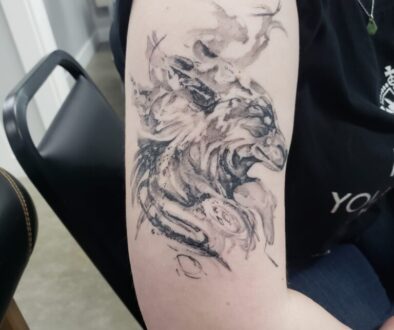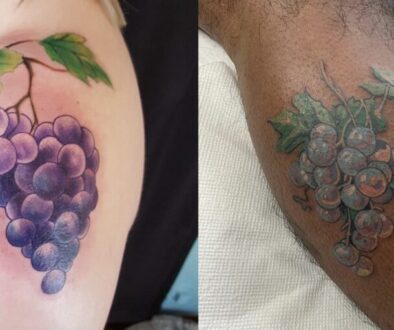Ask Better Tattooing: What Do I Need To Consider Before Getting A Tattoo?
|
Listen to this Article::
|
Table of Contents
Why is Communication Important to a Good Tattoo Experience?
Being a tattoo artist (tattooer) of 20 years, I am amazed at how often people tattoo their bodies. While I agree that being forward-thinking to a degree or being prepared to take care of the tattoo are important things, the time spent interviewing a tattoo artist is the most important thing to consider.
Because, as we all must be aware of by now, there are so many bad tattoos out there.
I cannot count the times I have been contracted to fix a tattoo. Almost every time contact has been made the clientele that reaches out has a story, one that usually follows a theme, like:
- “I really wanted to like this tattoo but…”
- “I had seen the drawing and it looked nothing like THIS!”
- “The tattoo artist was very assuring but halfway through I was absolutely devasted by how horrible the experience and tattoo was.”
- “I was treated so poorly, and they didn’t listen to anything that I said! I absolutely hate this tattoo”
The theme that links all these negative experiences is that the client feels unheard, undervalued, and unhappy.
To be blunt, they feel swindled.
Why a Tattoo Client Can Feel Poorly After a Tattoo.
Now, you may think me to be a little melodramatic, but I have had this conversation many times with clients. People who reach out to get a tattoo fixed, or just to find a new artist, are seeking something. More often than not it is to find hope, gather more information, or they want to be told that something is fixable. These burdened clients want to be assured that there is a better option to whatever experience to which they were subject to.
If the client reaching out is looking for a repair, the tattoo work they have is often not the best. The tattoo either have been applied with less skill than was necessarily required to do the tattoo, or the design was not well thought out.
The sad thing is that these clients know little of the tattoo process or how it went wrong because they know little to nothing about the why/how a tattoo was done. They have often also been treated very poorly by the artist, the shop, or by people in their area who critique previously completed work in a way that isn’t very nice. These scenarios seem tragic to me and often stem from poor communication.
So, Why do Tattoo Artists Act This Way?
It is because the industry is a machine, churning out people who utilize artistic empathy to do a trade/craft type job rather than rely on solid training to ensure a quality product. This is putting proverbial cart before the horse to me but, aesthetic principles have the chance to override functional ability in tattooing. An artist has the ability to hide under the radar by only showing their best work online and these “portfolios” are enough to justify quality over any complaint a client may have when experiencing a bad tattoo.
How Tattoo Artists Learn to Tattoo.
People learn to tattoo based on “feel” with little to no scientific evidence as to why something works. Little information is available for artists (or clientele) that help explain the why or how something is done, or how it went wrong. By operating by feeling without grounded, proven experience, artists are often left with a guessing game as how to best complete each and every tattoo. Each person internalizes their own perceived inabilities and communication most often shuts down.
Beyond that, tattoo artists are required by shops to often take on projects they would rather leave to someone else with more skill. Tattoo artists oftentimes live paycheck to paycheck, so turning down a source of needed income is difficult for some, impossible for others. When confronted with this choice, especially if questions are being asked by an inquisitive client, the natural reaction is to minimize, distract, or withdraw.
This effort to avert the eyes to any confrontation saves the ego, as well as the learned apathy of the artist, so they can continue pursuing the trade they have taken on – even if what they are learning is incorrect. These moments of truth in which critiques are actively avoided, create an industry where the artist is unable at times to speak up, which is a total breakdown in communication focusing on the artist’s growth. Partner this with a lack of communication between said artist and their client and you can end up with a real whopper of a tattoo.
This evasiveness leaves clients with little answers and a trust that hasn’t been earned through a rigorously tested artist. Trust in an artist only comes with experience. If it is a bad experience, well…. Yeah.
What Can Be Done to Fix the Broken Trust?
Everyone requires a little hand holding when they get into something new, especially when that experience is one, like a tattoo, that guarantees pain (to some extent). What’s more, I hear often that people are told what a stupid question it is to ask about tattoo pain (of course it hurts!), or how you must be careful to avoid upsetting the artist. These questions should be asked and answered! Denying the client a chance to ask questions, and for the tattooer to have a chance to answer them, is ignorant of the real issues at hand. It also creates a power dynamic where the client is beholden to the artist and the outcome becomes a game of chance.
This power dynamic is pervasive in the industry and needs to be confronted, because it robs the end users (the client) of properly investing in their tattoo work. You cannot critique, you cannot be involved, you cannot say anything.
Power Dynamics in Tattooing.
This imbalance goes so far as to create a system in which no one wins. The client ends up living with a less than perfect experience (or something even worse), and the tattoo artist loses out on a chance to improve and learn. What if the client noticed something before it happened, saved the day? Would the tattoo artist remember that thing that was almost sure to have destroyed something amazing? Things like making sure to check line weight, ensure things are spelled correctly, noticed how much distortion happens when a linear design is placed near the wrist…. Small steps that take little time can save so much later on.
This comes from good communication… and trust.
In most tattoo shops in the west, clientele walk in, tell an “artist” what they want, sit down to get a tattoo, pay the fee, get given a card or piece of paper with how to take care of a tattoo, and then they leave never to speak about the experience again.
What Happens When a Tattoo Client Feels Unheard?
It is very rare that I hear of a person who randomly walked into a shop was treated well. I also rarely hear they able to ask any question that they needed answered or were involved in the artwork creation throughout. They also are rarely involved in creating a care plan for their tattoo healing experience.
It is uncommon that I run into a client who has felt “heard” by another artist.
How to Improve Communications Between a Tattoo Artist and Client.
This idea of a holistic approach to tattooing, where the client is involved in the process, is not apparent in the western world now because the power to mark a person permanently has been passed to a person who, more often than not, has little to no training in:
- How to tattoo.
- What the psychology of a person getting the tattoo is.
- How to heal and handle different skin types.
- How to design a tattoo to the body/body type.
- Basic interpersonal skills.
- How genetics can play a role in the healing or longevity of a tattoo.
- Effective communication.
Yes, I know this is a scathing review of tattooing in the west and that many people must have had a good experience getting a tattoo! Why else would such a large portion of the population have a tattoo my dude!?
I get it. I know that people can have a good experience but answer me a few questions before judging my critique→
- How often do the people getting the tattoo have the chance to work with the tattooer to create something custom for their own body?
- Do people EVER get full control over what it is that they want to mark their body with?
- How often does the artist answer any and all basic questions about the safety and efficacy of a tattoo?
Questions like what is in tattoo pigment, what dangers are apparent in the procedure are meaningful. Other questions like how a person’s biology can affect the outcome of a tattoo should be answered, shouldn’t they?
How Should We Treat a Tattoo – Like a Medical Procedure?
If a person was going to get a permanent, cosmetic procedure on themselves, they go to see a doctor. If this doctor acted like a tattoo artist… would that person seeking help choose another doctor? What if that person wasn’t allowed to ask any questions or be involved in the decisions about their body?
What about a plumber? If a plumber said that they had only one type of toilet for a job, would you let them work on your house?
How about a hair stylist doing a hair style that they like but you have no choice over? I know I wouldn’t let someone just rock and roll on my dome… and that isn’t permanent!
In Conclusion
Some or all of this may seem out of the ordinary. For people who implicitly trust a tattoo artist to do their job perfectly with little to no input this idea of strong communication may be wholly avoided. But, for those of us who expect a level of professionalism above what the industry normally gives for a permanent cosmetic procedure, the lack of communication is something to consider before getting a tattoo.




